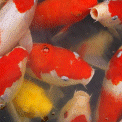|
Goldfish Killers
Case details (May 2000)
Small well-planted goldfish pond with about 20 goldfish. The client said that she had lost 6-8 fish over the last 14 days. No unusual behaviour.
Fish examination
The fish had large areas of skin erosion, including substantial erosion of the dorsal fin. The fin rays were intact, leaving just a row of bones sticking in the air. The skin erosion extended down from the dorsal fin, extending down and towards the tail. It was just the epidermis that had eroded, the scales were all intact.
A skin scrape showed no signs of parasites. There was no sign of inflammation or indications of a bacterial infections. The fish were lethargic.
 It was also noted that there were a large number of tadpoles swimming around the fish. A further inspection of the pond showed that the pond was in fact alive with tadpoles. A net skimmed along the bottom was full of them - several hundred at least. It was also noted that there were a large number of tadpoles swimming around the fish. A further inspection of the pond showed that the pond was in fact alive with tadpoles. A net skimmed along the bottom was full of them - several hundred at least.
Indeed, it was the tadpoles that were literally eating the fish!
Past experience
This is the second case I have seen like this and I must confess that when I was first asked to come out because "the tadpoles are eating my fish", I was very cynical and did not believe the customer. However, in that case, because the water was clear, it was possible to see the fish swimming around with dozens of tadpoles attached to their body.
The answer
In this situation the fish have to be separated from the tadpoles. Ideally the tadpoles should be removed to a wildlife pond - but this may not be practical. This does mean removing the fish from the pond and doing a major clear-out to make sure that the majority of the tadpoles have been removed.
Tadpoles are not normally killers
I urge everybody to read this before tadpoles and frogs start to get bad press. It is important to realise that this situation occur because of a particular set of circumstances - and could have been avoided.
In both these cases the pond was overgrown with "oxygenating plants". This had two important effects.
 |
The dense growth provided ideal protection for the tadpoles, enabling them to escape normal predation. It also provided food so that they could grow and boy were these big fat tadpoles!
|
 |
The second factor is that the weeds reduced the fish's ability to swim around the pond freely and as the battled their way through the weed they were an easy target for the masses of tadpoles in the weed
|
I have masses of spawn in my ponds every year but the majority of the tadpoles die along the way. However, I know that several dozen frogs make it and I wouldn't want it any other way. At any time I can always find a frog or two in my filters and I certainly do not view them as killers.
What this case illustrates is that when conditions move away from the norm and the balance of nature shifts, it tends to favour some and disadvantage others. In this case it was frogs and goldfish. The pond had moved away from being an ideal habitat for goldfish and had turned into a frog pond
This situation is no different to when ponds are over-stocked or poorly maintained - creating conditions where parasites and bugs can proliferate.
So whether its goldfish, koi or other fish, it's important to make sure that we provide ideal conditions for the fish, and keep the balance firmly tilted in their favour.
-fpi
|



